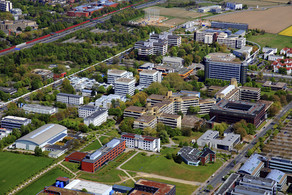How ChatGPT reports on climate change
- TU News

Chatbots such as ChatGPT are now able to generate structured texts of various genres. To do this, artificial intelligence (AI) draws on information from the internet. There is a lot of information on climate change in particular that is not scientifically tenable. Prof. Bernd Sommer and Sarah von Querfurth from the Department of Social Sciences have therefore conducted an exploratory study to investigate the narrative generated by ChatGPT on climate change. Their study was published at the beginning of March in the journal "Ambio. A Journal of Environment and Society", which is published by the Royal Swedish Academy of Sciences.
ChatGPT is now also being used for educational purposes, for example by pupils and students to help them with homework, lectures or presentations. "This is changing the way information is generated and processed in society. Knowledge and perception of socially relevant topics such as anthropogenic climate change can also be influenced by ChatGPT," explains Prof. Bernd Sommer, an environmental sociologist specializing in transformation research. Together with Sarah von Querfurth, he has therefore analyzed which narrative ChatGPT creates in its texts on climate change. "This is relevant and interesting insofar as there is a lot of misinformation and deliberate disinformation about climate change on the internet that does not correspond to the scientific consensus. There are also very different positions on the question of what measures should be taken to tackle the climate crisis," says Sarah von Querfurth.
Narratives correspond to the scientific consensus
To create the texts, the two ChatGPTs issued a fairly general challenge: "Write a story on climate change." Their idea was that no specific specialist knowledge was required to create the stories. For their exploratory study, the two researchers had the chatbot generate new stories until a "theoretical saturation" was reached: after 14 stories, ChatGPT's narrative on climate change was to a certain extent exhausted. Only superficial details such as the names of actors varied; no substantial new content was added.
All narratives corresponded to the scientific consensus and contained no aspects of climate change denial. They strongly resembled the discourse that is predominantly presented by political actors, international organizations and respected media. According to the two social scientists, it was striking that the AI located all their stories about the factual climate change of the present in a fictional setting without being explicitly asked for a fictional story. The stories each followed the same structure: the starting point is a harmonious state in which humans live in balance with their natural environment. Due to the use of fossil fuels and the overexploitation of natural resources, this state is disrupted. After initial hesitation, the people in ChatGPT's stories decide to take action and in particular to use renewable energy and other "clean" technologies. The stories mostly ended well - in the end, the harmonious state was restored.
ChatGPT generates depoliticized stories about climate change
"In this way, ChatGPT primarily generates ideas of ecological modernization and is close to the current discourse, which mainly focuses on technical solutions to the climate crisis," says Sarah von Querfurth. Overall, however, socially relevant aspects of the debate remain underexposed, in particular questions of causation, vulnerability and mitigation, i.e. the mitigation of climate change. "ChatGPT did not link specific industries, polluter states or particularly high-emission practices to the climate crisis. Questions of climate justice were therefore barely addressed; instead, abstract people who are not named more precisely are responsible for climate change. In this sense, the stories of ChatGPT can also be described as depoliticized," summarizes Prof. Bernd Sommer.
Following on from this finding, the two researchers then explicitly asked ChatGPT to formulate stories on the topic of climate justice. The basic structure of the stories did not change as a result, but the different degrees to which people were affected by climate impacts, intergenerational aspects and the divergent contribution to causing the crisis were now addressed in these stories.
Contact persons for queries:



